
A contract’s a contract, right? You describe what will be delivered when, how much the customer owes, and sign on the dotted line. If only it were that simple. There are many types of construction contracts out there. The construction industry uses different kinds of agreements depending on the project’s scope, delivery, schedule, budget, and the parties involved.
Knowing which construction contract to use when is critical to ensuring a successful outcome in delivery, customer satisfaction, and profit. We’ve made things easier by compiling the eight most common types of construction contracts and detailing the pros and cons of each.
What we cover:
Key Takeaways

It's important to get on the same page about some of the key definitions and terminology when it comes to contracts.
A construction contract is a legally binding set of documents typically between a contractor who is taking on the work and the owner who is requiring the work. Contracts in construction are comprehensive covering everything including cost and payment terms, schedule, scope, specific tasks to be performed, and any other contract terms required by one of the two parties. The contract also notes how any disputes should be handled.
An addenda, or addendum, is a modification or clarification to an agreement, contract, or document. It can be presented before or after a contract has been executed. The intent being to make the addenda a part of an agreement once signed by all parties. Terms of an addenda could impact scope of work, project schedule, or costs.
A change order request (COR) is a formal document compiled by a contractor to let a project owner or client know the scope of work has changed, why it has changed, and that changes to the contract are being requested as well.
In short, the contractor groups related potential change orders (PCOs) by issue and scope of work, and turns them into a more comprehensive change order (CO). Once all parties understand and agree to the change order request, the changes can be executed contractually.
This is a more efficient way for normal, contractual conflicts with cost and schedule to surface rather than requiring a change order every time a new issue is discovered.
A field order is a minor adjustment to an original contract that allows owners and contractors to alter the scope of work within reason. The purpose of a field order is to allow stakeholders to make quick, necessary amendments to scope of work that would otherwise require the more formal and lengthy change order (CO) process. Since change orders are often time intensive and may hold up project progress, field orders enable progress through minor issues that would otherwise create avoidable cost overruns.
Construction is a highly complex and risk adverse industry. Most importantly, contracts help safeguard both parties from many major disputes and legal issues. Without a contract, these disputes and legal troubles could threaten to halt a project entirely and put a contractor out of business. Furthermore, contracts provide clarification on project specifics and financial details needed to move work forward.
Key elements of a construction contract include:


Under a cost-plus contract, contractors are paid for all of their construction-related expenses. That’s the cost part of the name. The construction costs can include direct costs such as labor, materials, supplies, etc. They also include overhead costs such as insurance, mileage, a portion of your office rent. Additionally, they also receive an agreed-upon amount for the profit. That’s the “plus.”
This type of construction contract is usually looked upon pretty favorably by contractors. There’s seemingly no risk of losing money on materials. Plus, you know you’ll incur a profit. These types of construction contracts are especially useful when you don’t have enough information to provide a thorough estimate of work or the scope is not well-defined. They also prioritize quality.
However, there are a few details about these types of contracts to be aware of. First, you’ll need to keep track of all of your expenses and be prepared to present them. That can require additional resources and labor costs on your side. You may also be limited on how much you can spend. Some cost-plus contracts include clauses with “not to exceed” amounts for costs.
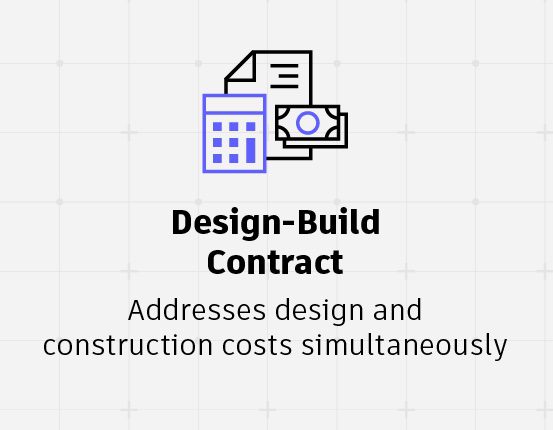
Traditionally, owners receive completed designs before taking in construction bids. That leads to two separate construction contracts and a longer process. But the design-build contract does things differently. As the name suggests, a design-build contract addresses design and construction costs simultaneously. Under this type of contract, the construction process actually begins before the final design is completed. This process saves the owner time and money by combining the design and construction project delivery into one contract. It also helps to streamline communications and create repeatable processes.
The design-build contract helps to speed up the process and avoid disputes between the designer and builder. It’s popular with organizations that want to accelerate project delivery, lean into the benefits of collaboration, and streamline processes. Designers also have more input in the construction drawing process, reducing the need for changes.
Some of the pros of design-build contracts can also lead to cons. Because there’s no competitive bidding phase, the final costs may be higher for the owner. It’s also more difficult to estimate costs due to the necessary collaboration between designer and builder.
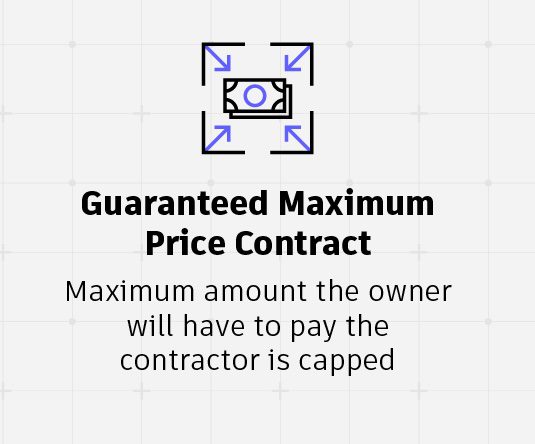
Under the guaranteed maximum price (GMP) contract, the maximum amount the owner will have to pay the contractor is capped. The GMP construction contract limits the amount the owner will have to pay, and any additional expenses incurred are covered by the contractor. These agreements limit the cost-risk for the customer. They clearly define the most the owner will have to pay, which makes budgeting much easier.
The GMP includes costs for labor, materials, overhead, and a percentage of those costs to generate a profit. If the final costs come in under the GMP, the customer may receive all of the cost savings or share them with the contractor. For contractors, it can also help to expedite the lending process.
Similar to the cost-plus contract, this construction agreement does require careful review and analysis of expenses. This can be particularly time-consuming on large, multi-phase projects. It also places the majority of the risks on the contractor. If the original estimate ends up being below the final costs, the contractor can lose money on the project.

Incentive contracts provide the contractor with an agreed-upon payment if the project is delivered by a certain date and at a specific point. If the project is delivered at a lower cost and/or by the target deadline, the contractor receives extra payment. The amount they receive is specified in the construction contract and may be based on a sliding scale. In other words, the contractor is incentivized for controlling costs and staying on schedule.
These contracts aren’t just beneficial for controlling costs and timelines. They also help to create a more collaborative process where the contractor has more ownership. Because of the incentive phased approach, the contractor and owner often communicate more and look for innovative ways to get the job done.
Incentive contracts do require more negotiation to determine the incentives. It’s important for contractors to ensure that the costs and deadlines are achievable. If the terms and conditions are not clear, it can leave room for disputes. Contractors need to clearly define what meeting the incentive looks like so there are no miscommunications when the project is delivered.

According to Lean IPD, “Integrated Project Delivery (IPD) is a delivery model for delivering construction projects using a single contract for design and construction with a shared risk/reward model, guaranteed costs, waivers of liability between team members, an operating system based on lean principles, and a collaborative culture.”
The IPD contract is a multi-party agreement between the design firm, the builder, and the owner. It may also include trade partners. Subcontractors typically fall under the contractor’s portion of the agreement. This construction contract agreement will tie the subcontractors to the contractor, but they will not serve as a signatory like the contractor. Like the design-build contract, it brings all of the deliverables into one single contract.
This type of construction contract spreads the risk and rewards of the project across the designer, builder, and owner, dependent on the project’s financial results. The IPD contract generally includes costs for design, construction, and the shared contingency. The risk and reward parties (i.e., the signatories on the contract) agree to receive payment for their costs and shared savings if the project meets the performance requirements outlined in the contract. These parties agree upon a lump sum profit if the project meets the defined financial outcomes.
IPD contracts are popular with teams that want to prioritize innovation and collaboration. They promote a sense of ownership and teamwork as all parties must work together to achieve the desired rewards. They also spread the risk and reward fairly across parties and foster greater accountability for the results of the project.
However, the IPD contract isn’t a magic wand. Each party needs to remain committed to the IPD model or risk reverting to traditional project delivery methods. IPD is still relatively new in the industry, so some design firms and subcontractors may not want to participate. Some contractors find it difficult to secure financing for these projects as well.
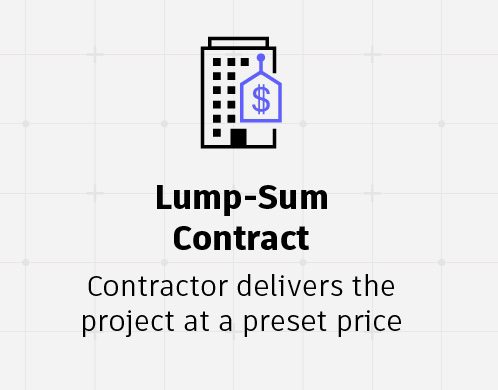
With a lump-sum contract, the contractor delivers the project at a preset price. The contractor will deliver a total price for the project rather than bidding on the deliverables. The construction agreement is relatively simple and works well for projects with a well-defined scope. They’re popular with straightforward work that doesn’t require detailed estimates. This type of construction contracts also makes administration and cash flow estimates easy.
The lump-sum contract presents a digestible, easy-to-plan-for figure to the owner. These agreements streamline business analysis and the selection process as well. They give the contractor the flexibility to focus on quality, materials, and output. Unlike time and materials contracts, lump-sum contracts don’t dictate as much owner supervision and approval.
Lump-sum contracts aren’t usually a good fit for more complicated projects. They don’t factor in changes in material costs, site conditions, or requests from the owner. For the lump-sum construction contract to pay off, you’ll need to be able to estimate the project’s schedule, materials, labor costs, overhead costs, and profit margins easily.
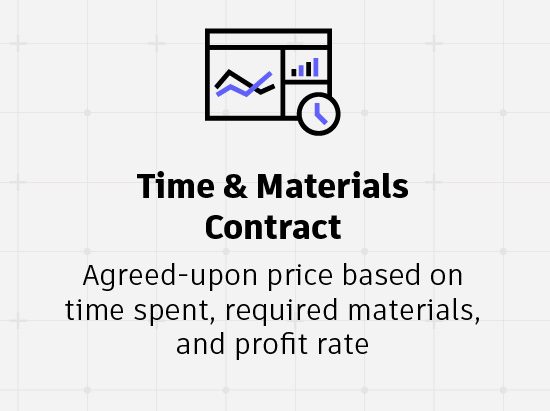
Under a time and materials (T&M) contract, the owner pays an agreed-upon price based on the time spent on the project, required materials, and the included profit rate. Like the lump-sum contract, this construction agreement is simple and straightforward. However, T&M contracts allow for more flexibility in the costs of the materials and account for labor rates. They may also include a mark-up for the materials if they are purchased at wholesale rates.
T&M contracts help the owner to budget for the overall costs while reducing the risk on the contractor’s part in the case of fluctuating material and labor costs. They also help to prevent cost-cutting methods as the contractor knows they’ll receive a profit.
There are some potential downsides to this type of construction agreement. There’s less transparency about the final cost for owners, which can lead to disputes along the way if prices rise. Inaccurate estimates can also potentially eat into the contractor’s profit margins.
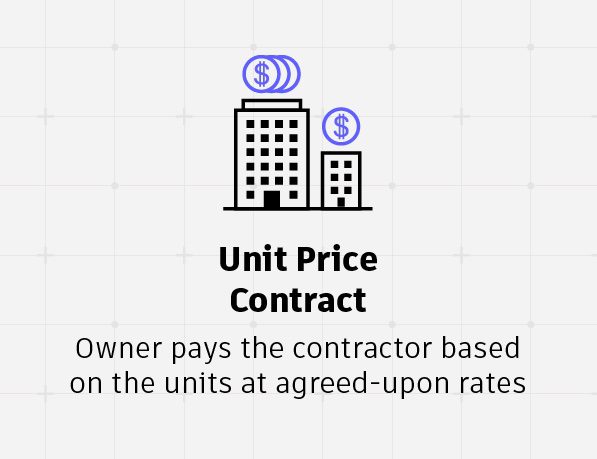
The unit price contract details prices per unit, which may include materials, labor, overhead, supplies, and profit. The owner pays the contractor based on the units at agreed-upon rates. This type of contract for construction may or may not include the number of units needed to complete the project but will likely include at least an estimate.
These contracts work well with projects that can be easily divided into units. If your project is largely dependent on the price of the units and involves repetitive tasks, a unit price contract may be a good choice. Contractors who use unit price contracts find the simple invoicing and shared risk beneficial.
They’re not always a good fit for complex projects that require complicated tasks and many different types of materials. They don’t incentivize contractors and can lead to profit loss if the initial estimates are off-target.
Understanding the different types of construction contracts and agreements is essential for selecting the right one for your project. Whether you need cost certainty, flexibility, or shared risk, there’s a contract type designed to meet those needs. Be sure to thoroughly review each option with your legal and construction teams to ensure it aligns with your project goals.
Want to maximize the value of your digital bid management solutions? Download our eBook to learn how:
Retention is a percentage of the payment withheld by the owner until the project is completed to ensure that the contractor fulfills all contractual obligations and corrects any defects or issues.
Most contracts include clauses for delays, which may result in penalties for the contractor or extensions of time if delays are caused by factors beyond the contractor's control (like weather or material shortages).
Liquidated damages are pre-agreed monetary penalties outlined in the contract that the contractor must pay the owner if the project is not completed by the specified deadline.
Common methods for dispute resolution include mediation, arbitration, and litigation. Some contracts may specify alternative dispute resolution methods to avoid lengthy court battles.
Yes, a construction contract can be terminated under specific conditions outlined in the agreement. Typically, this happens if one party fails to meet its obligations, breaches the contract, or due to unforeseen circumstances.
Payments can be structured in various ways, including lump sum payments, milestone payments, or progress payments, where the contractor receives payment for completed stages of the project.
